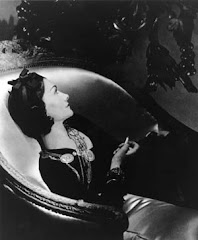
Hadley Freeman has a very interesting piece about being a judge at Graduate Fashion week.
Her point is that because fashion courses in Britain are based at art schools, designers have a supreme understanding of art and none about commerce, ie how to produce clothes that someone would want to wear. Including the designers themselves:
That brings us back to the question of why British students favour the artistic over the commercial. Marian McLaughlin, head of the international office of the Amsterdam Fashion Institute, is attending the London shows and agrees that undoubtedly British fashion students favour "quirkier designs". "You can really see the difference between them and other nationalities," she says. "Probably it's because of the art-school influence. It does produce interesting clothes, but I don't know whether they get jobs afterwards. All of our students definitely do."
But Marten Andreasson, fashion tutor at the University of Middlesex, disagrees.
"I think that, for the students, it is definitely more important to emphasise the creative because this is the time when they have the freedom to experiment and express themselves," he says. "By the time they get to their graduate show, then they should have decided whether they want to go commercial or be more experimental." But what happens to the ones who want to make collections based on the Holocaust? He makes a tactful shrug. "They probably go off and do MAs ..."
This is another thing that puzzles me. Fashion students say that their work is about "self-expression", but what they make always seems to be an awfully long way away from what they actually wear. There are a lot of pretty printed dresses and German tourist-esque shoes in the audience - almost none on the runways. Sharon Dewar, 29, a student at Heriot-Watt University in Edinburgh, agrees that the delicate, multi-layered black dress she has designed doesn't seem to have much in common with the jeans-and-grey-cardigan combo she is wearing. "That's true. But I design things I aspire to, as opposed to things I actually wear, and it's a designer market I'm aspiring to." So what does she think is more important - being commercial or being experimental? "It's a balance really, isn't it? You want to enjoy making the clothes and other people to enjoy wearing them."
UPDATE Greying Pixie has some trenchant remarks on this in the comments.
